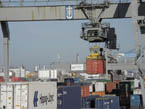Understanding International Logistics: A Comprehensive Overview
International logistics refers to the process of managing the movement of goods and materials across borders to meet customer demands. It plays a crucial role in global supply chain management, ensuring efficient delivery of products from manufacturers to consumers worldwide. By integrating transportation, storage, and inventory management, international logistics enables businesses to reduce costs, improve delivery times, and enhance customer satisfaction.
Key players in international logistics include manufacturers, distributors, transportation companies, and logistics providers. These entities work together to streamline operations and optimize delivery routes, taking into account factors such as customs regulations, shipping costs, and delivery timelines. Advanced technologies like blockchain, artificial intelligence, and real-time tracking further enhance the efficiency and reliability of international logistics processes.
The importance of international logistics extends to various industries, including manufacturing, retail, and e-commerce. It facilitates global trade by ensuring seamless movement of goods across borders, while also addressing challenges such as tariffs, trade barriers, and currency fluctuations. By adopting innovative solutions and adhering to international standards, businesses can leverage international logistics to strengthen their global presence and achieve sustainable growth.
In conclusion, international logistics is a vital component of modern global supply chain management. It enables businesses to meet customer demands efficiently, reduce costs, and enhance their competitive advantage in a rapidly evolving global market. By continuously optimizing processes and embracing emerging technologies, companies can further leverage international logistics to drive success and innovation.
